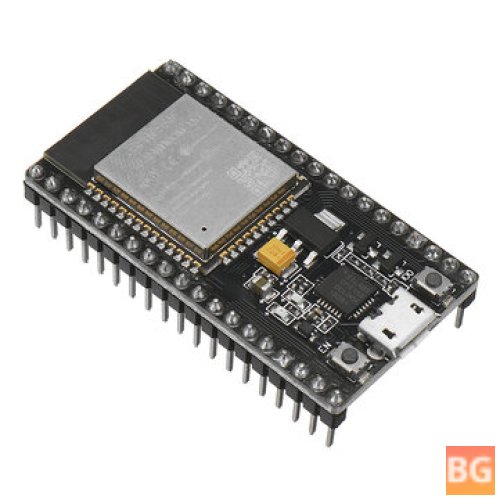The ESP32 Dev Board is a reliable and efficient solution for developers looking to embed WiFi and Bluetooth functionality into their projects.
Its integration of various components into one efficient solution makes it a cost-effective option that saves time and effort in development. Additionally, its support for LWIP protocol and freertos provides flexibility in project development. However, potential buyers should consider the lack of documentation available outside of the Github repository. In conclusion, the ESP32 Dev Board offers a wide range of advantages for developers and is a worthy investment for any developer looking for a reliable solution for their projects.
In this review we'll be exploring the ESP32 Dev Board - a WiFi+Bluetooth enabled development board that boasts a dual-core, low power CPU.
This small yet powerful board is designed to integrate various functions including antenna switches, RF balun, power amplifiers filters, and power management modules into one efficient solution. We're eager to delve into the features of this board and see what it has to offer.
When tested the ESP32 Dev Board proved to be a cost-effective solution for developers looking to embed WiFi and Bluetooth functionality into their projects. Its small size makes it easy to integrate into any product, while its powerful dual-core CPU supports LWIP protocol and freertos. The board supports three modes - AP, STA, and AP+STA coexistence mode - providing flexibility according to the user's needs. Additionally the Lua programming language makes development a breeze.
As a result of its impressive features and capabilities, the ESP32 Dev Board is an excellent choice for developers looking for a reliable and efficient solution for their WiFi and Bluetooth enabled projects.
To put it succinctly the ESP32 Dev Board offers a wide range of advantages for developers. Its integration of various components into one efficient solution makes it a cost-effective option that saves time and effort in development. Additionally, its support for LWIP protocol and freertos provides flexibility in project development. However, as with any product, there are some drawbacks to consider. One potential disadvantage is the lack of documentation available outside of the provided Github repository.
In essence the ESP32 Dev Board is an excellent choice for those looking for an efficient and reliable solution for their WiFi and Bluetooth enabled projects. However, it's important to consider the lack of documentation available outside of the Github repository when making a purchase decision.
In conclusion if you're looking for a dual-core, low power CPU development board with WiFi+Bluetooth capabilities that's easy to integrate into any product, the ESP32 Dev Board should unequivocally be considered. Its integration of various components into one efficient solution makes it a cost-effective option that saves you time and effort in development. Despite some potential drawbacks regarding documentation availability, its impressive features make it a worthy investment for any developer looking for a reliable solution for their projects.
